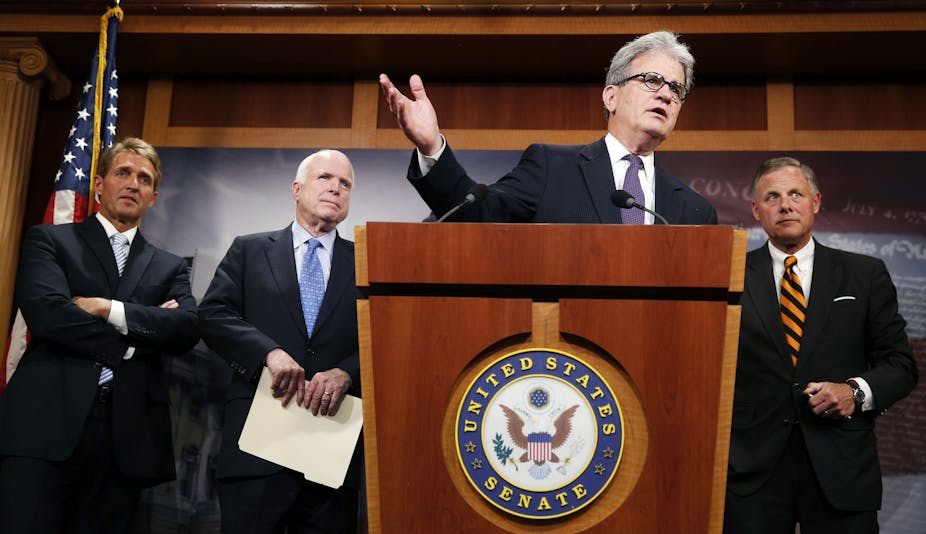The midterm elections have come and gone. After months of speculation, the results were largely predictable. The Republicans solidified their position in the House and took the Senate. A sixth year president’s political party has suffered a defeat, and we have moved to a situation of even more starkly divided government.
The Republicans are understandably buoyed by control of both parts of Congress and enthusiastic about their prospects for the 2016 presidential election. President Obama will spend the next two years relying to a greater degree on Executive Orders and his capacity to veto in what will largely be a rearguard political action.
And in case you didn’t think it was possible, the Republican criticism of his presidency will grow even more voluminous despite his offer to work with the new Congress.
The congressional Democratic leadership, in contrast, have a terrible choice: they will either become relatively mute presidential cheerleaders or will vocally blame their misfortune on the president, risking a fissure within the party and of isolating themselves even further from the halls of power. Aficionados of the show The West Wing have seen this script before.
The main battleground will likely be over domestic issues: economic ones such as the budget, taxation and welfare, and social issues such as reproductive rights and immigration reform. It is a perfect scenario for legislative paralysis.
So what about the foreign policy issues that have preoccupied Washington in the last few months – from Russia to “Syrac” and Ebola? How will the new Congressional configuration influence the President’s strategy in the aftermath of the election?
What ‘water’s edge’?
In 1948, as Chair of the Senate Foreign Relations Committee, Republican Senator Arthur Vandenberg coined the phrase “politics stops at the water’s edge.” The sentiment was that, while domestic politics may vehemently divide Americans, we thought about foreign policy issues rather differently. Vandenberg was referring to the creation of NATO at the time, an organization that has served America’s national security interests well. In the period after World War Two, suggested Vandenberg, the traditional wrangling about partisan party interests clearly had no place.
Becoming a well-worn cliché, Vandenberg’s quote was perennially invoked for much of the remainder of the twentieth century when it came to negotiations between presidents and the congressional leadership over foreign policy. Foreign policy was regarded as bi-partisan, as sacrosanct. Yes, there were major exceptions. Indeed, by the end of his term as presidency, Vandenberg’s Republican colleagues berated Harry Truman for his ambitious foreign policy. Over a decade later, Americans were deeply divided over the Vietnam War and debates were seeped in party politics.
Yet, the truce often held. And faced with a threat, consensus (if not unanimity) has still been the most routine response. Congress supported the wars in Afghanistan and Iraq with little more than a whimper. Although on a far smaller scale, and with only the flimsiest of threats, the same was true of the invasions of President George H W Bush’s invasion of Panama and Ronald Reagan’s invasion of Grenada.
But the ethos of bi-partisanship in foreign policy truly began to ebb away with Republican criticism of Bill Clinton’s efforts at intervention in the Bosnian war and has largely been abandoned during the Obama Presidency. There have been few Republican voices in support of the president on any foreign policy issue. Hawks among their ranks, like John McCain and Lindsey Graham, have characterized the president as timid and hesitant. Isolationists describe him as too deferential to foreign governments and the United Nations.
So ironically, for three reasons, Tuesday’s results will change very little when it comes to foreign policy.
Gridlock in the White House’s favor on foreign policy
First, the president has much more latitude when it comes to foreign policy than domestic politics. Congressional refusal to declare war in Iraq and Syria may be addressed in a lame duck session. And criticism of the intervention, and the lack of a formal vote, will certainly grow if things go alarmingly wrong. But presidents have found the means to by-pass congressional disapproval in the past and Obama will be no different on that score.
Second, Republicans have learned to oppose the president as a matter of principle. But they have no unified position on any of the major foreign policy issues. They are divided on what to do about the big issues like Russia or the Islamic State. They generally don’t care about the small ones as long as they are seen as patriotic. The only thing that unites them is, their criticism of the president.
And finally, the only place where they can really hit the president hard is in the President’s wallet – in this case in the military’s budget. Yet the sequestration process initiated in 2013 has had very little effect on the nation’s military expenditure. The Pentagon’s base budget was cut by an estimated $37.2 billion in 2013 (about 5.7%) and is forecast to remain flat this year. But these figures obscure rather than reveal the truth: off-budget loopholes, including congressionally approved funds for wars, largely mitigate the effects of these cuts. Looking ahead, the Republicans are traditionally wedded to their identity as the party of strong national security policy. And so even though a few Republican voices might call for greater and more effective cuts, most within the party are unlikely to regard that as a winning strategy in the run up to the 2016 elections.
So Vandenberg’s bi-partisanship may be a thing of the past. But continuity rather than change is the most likely scenario for the next two years. The new Republican Congress will be frustrated in its efforts to stymie presidential initiatives in foreign policy, and the president will be frustrated in his attempts to reason with the new Congress.
Many things may change. But if history is any guide, when it comes to foreign policy, gridlock will favor the president.

